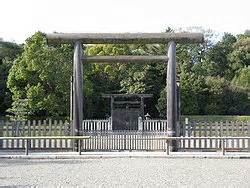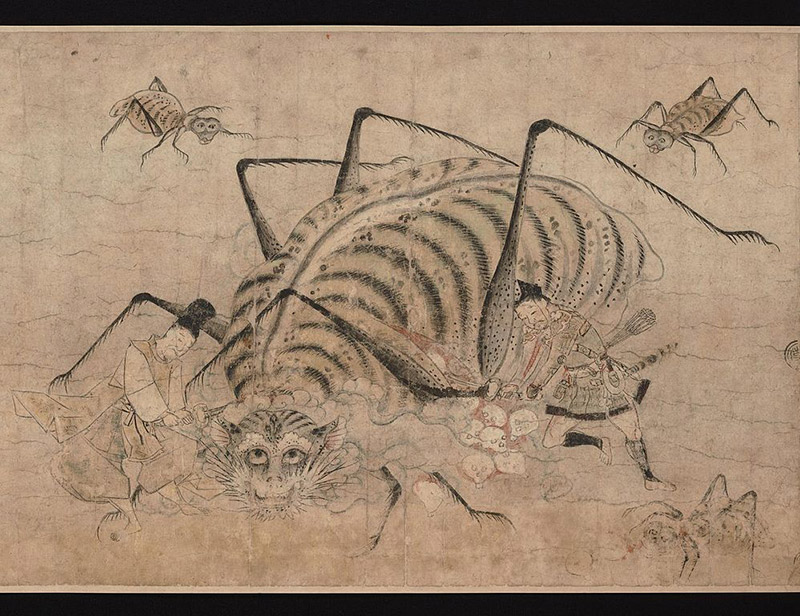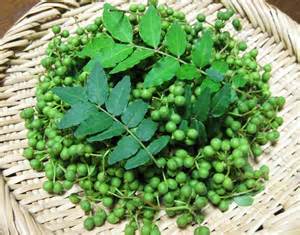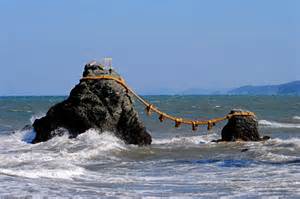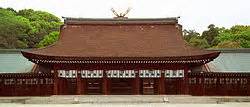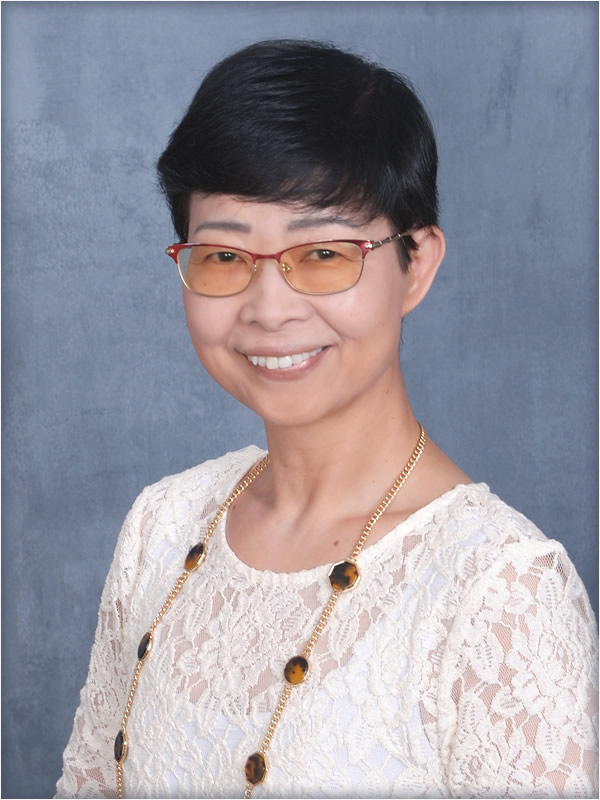Emperor Jimmu Born
(Tomb of Emperor Jimmu)
Kamuyamato, who was backed by all the Heavenly Gods, continued his journey to the throne. The next challenge was waiting for him in Osaka (Sakurai, Nara, Japan – this is NOT “Osaka <大阪>”). There was a big rock cave. Inside, Yasotakeru (=Many Brave Men), who belonged to “Tailed” Tsuchigumo (the derogatory name of the local people who didn’t follow Kamuyamato), were ready to kill the Heavenly Child, growling viciously.
(Later on, Tsuchigumo was to be depicted as Monster Spider like this!)
Kamuyamato came up with a clever plan to kill them. He sent plenty of special special food to Yasotakeru with his own cooks, who were equipped with swords. They were told to attack Tsuchigumo when they heard Kamuyamato sing a poem made by him. Kamuyamato’s poem went like this:
“Lots of vicious soldiers congregate in the rock cave in Osaka.
No matter how many of those may congregate,
they are to be beaten up by my brave and strong soldiers called Kume.
They are to be killed by Kume soldiers with special swords.
They have no chance.
Now is the time when my soldiers will kill them all!”
As soon as Kume soldiers heard their lord sing, they slaughtered all of Tsuchigumo. Later on, Kamuyamato sang another poem when he was about to kill Tomibiko, who had killed Itsuse-no Mikoto, Kamuyamato’s brother. The poem he sang went like this:
“Kume soldiers cultivate millets in their fields.
There are stinky garlic chives (=enemies led by Tomibiko) in the fields.
You must pull out their stinky roots
when you pull out the leaves of stinky garlic chives.
They have no chance
because we will slaughter them all
as we pull out all the stinky garlic chives in our fields!”
(Garlic Chive)
Kamuyamato kept singing a poem:
“Kume soldiers planted Sansho (= Japanese pepper)
beside their fences.
Those Sansho have a burning taste.
We will never forget the very burning taste
we had when they killed my brother!
We are certain to retaliate!”
(Raw Sansho)
(Dried and Ground Sansho for Sale)
The Heavenly Child kept going:
“There is a big rock (= the enemy’s fort) in the sea in Ise
where the Wind of God blows.
The big rock is covered with conch shells.
My Kume soldiers are like those conch shells.
They swarm our enemy’s fort
until all of them are extinguished!”
(“The Couple Rocks” in Ise)
Kume soldiers became exhausted when the battle against Eshiki and Otoshiki took so long. Thus, Kamuyamato sang a poem again:
“We are all starved
because of the long lasting battle
we fought with our mighty weapons,
proceeding in the mountains.
Merciful cormorant fishers,
send us food immediately!”
(Cormorant Fishing and Fishers)
By the way, “Shiki” in Eshiki and Otoshiki is a name for a certain location in Nara. Eshiki and Otoshiki accordingly seem to be one of the local clans. In “Nihon Shoki* (another historical record like ‘Kojiki’),” you will see both names – Eshiki and Otoshiki spelled differently. Eshiki rebelled against Kamuyamato and was killed by him. On the other hand, Otoshiki, Eshiki’s younger brother, pledged allegiance to him and became an ancestor of Shiki-no Agatanushi.
Now that Eshiki and Otoshiki were conquered, a local god called Nigihaya-no Mikoto showed up and said, “I heard that you would come down from the Heavenly World to rule the Earthly World. I am here to serve you, Lord.” Nigihaya showed the proof of his identity called Amatsu Shirushi and turned it in to Kamuyamato. According to him, Nigihaya had already conquered Tomibiko for Kamuyamato before he arrived.
Nigihaya married Tomiyabime, a sister of Tomibiko. Their child was called Umashi Maji-no Mikoto, who became an ancestor of Mononobe-no Muraji, Hozumi-no Omi, and Uneme-no Omi.
Those six poems Kamuyamato sang are called “Kume Uta.”
Finally, the chosen Heavenly Child called Kanuyamato Iwarebiko-no Mikoto subjugated the whole country. Some small enemies were chased away. Now the first Japanese Emperor ascended the throne in Kashihara-no Miya in Nara. From then on, he was to be called “Emperor Jimmu.”
(Kashihara-no Miya in Nara)
*Nohon Shoki: https://en.wikipedia.org/wiki/Nihon_Shoki

